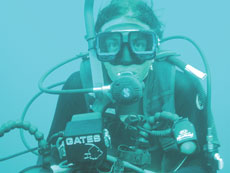 Courtesy of Anca Segall
Courtesy of Anca SegallScience teaches that to understand an organism, you must understand its environment.
To understand a scientist, you must hang out in his lab. Spend 10 minutes in Forest Rohwer’s workspace, and you realize it’s an environment in which some scientists might not survive.
There are no lab coats in sight, no dirty beakers cluttering the sink. There is, however, a bottle of Terrapin Cellar’s 2005 Pinot Noir. “Always wine,” Rohwer says chuckling. “It’s the best way to get to sleep.”
There is a welcoming black futon, where visitors can rest while Rohwer advises his students. Today, he’s on the phone with a former student working on a coral reef monitoring program in Sri Lanka.
His ability to build and maintain relationships – even in Sri Lanka, where cell phone reception is slightly better than in an elevator – is one half of what makes Rohwer so successful. The other half is his dedication to research.
Rohwer’s modest. He wouldn’t mention his inclusion in the Fellowship by the American Association for the Advancement of Science if you don’t mention it first.
The AAAS, founded in 1848, is the largest general scientific society. On Nov. 27, Rohwer’s peers elected him as a 2006 Fellow based on his work with bacteria.
Rohwer’s focus is on phages, viruses that attack bacteria. He’s studied the effect of phages on carbon dioxide in the ocean. Phages push carbon dioxide to the earth’s surface and into the atmosphere, affecting the quality of oxygen. Rohwer’s ultimate goal is to learn how to control phages as a way of stopping global warming.
Rohwer, in his third year at San Diego State, began as an adjunct teacher, a position that doesn’t require a professor to have students, allowing him to strictly focus on research.
“It’s a really cool job,” Rohwer said. “It’s the best of both worlds. You have no boss, you can do what you want.”
From the description of his previous job, Rohwer may sound like he believes students are a chore. But Rohwer is one of the most popular teachers in the biology department.
“People come up to me and ask, ‘Your work for Forest, what’s that like?'” said Becky Vega Thurber, a post-doctorate student who Rohwer advises. “When he goes to meetings people always say, ‘Hey Forest! What’s up?'”
“He’s the rock star of biology.”
His hair alone would lead you to that conclusion, but it’s more than the Alice Cooper-like long, messy, black locks. Rohwer’s students adore him for his mentoring style.
Rohwer encourages his students to pursue unique research opportunities and give them the opportunity to have their names printed on publications and research grants. Vega Thurber, who earned her Ph.D. from Stanford, said she has seen instances where the greed of a professor for top billing can take away from the accomplishment of a student. At Stanford, most of the people Vega Thurber worked with had their names published on research papers five times. She said because of teachers such as Rohwer, the opportunities for students to be published double at SDSU.
“He’s amazing,” Vega Thurber said. “He’s dynamic, he thinks outside the box. Scientists aren’t willing to take risks. He wants to do the risky thing.”
Many scientists are stuck looking through the metaphorical microscope, limiting their research to a narrow topic. Rohwer’s view of the world is vast and his ideas reflect that.
His future ideas for projects include; naming all of the viruses in the world and trying to describe all the viruses on the human body. He believes that phages hold the answer to why two people absorb different amount of calories from eating that same kind of food.
Those two ideas, intricate and broad, show why the AAAS named Rohwer a 2006 Fellow, but another idea speaks to him as a person.
The lab, the place where a scientist would seemingly be most comfortable, is constricting in a way for Rohwer, who spends much of his time in the field. Rohwer is looking for funds to make his lab mobile so he can visit a sight and take bacteria samples in real time. This would allow him to account for errors while in the field.
“Everyone thinks he’s crazy,” Vega Thurber said. “I think he’s crazy, but he’ll probably get it done.”
It’s a risk the rock star of biology has to take.






